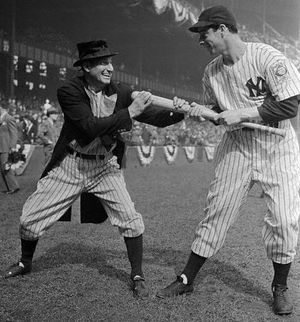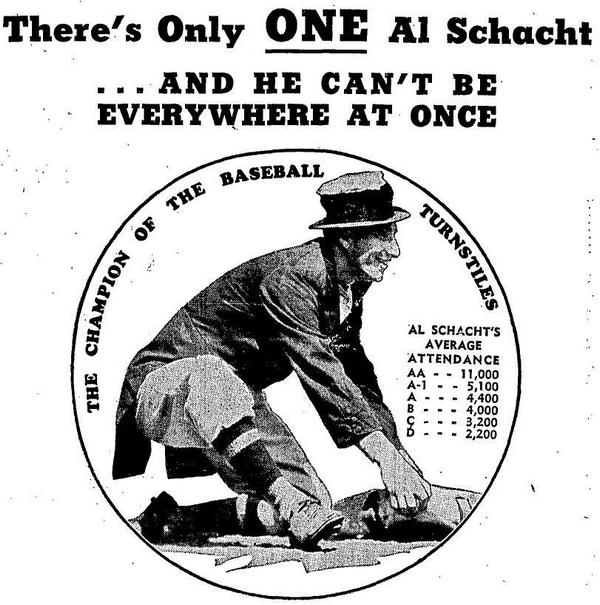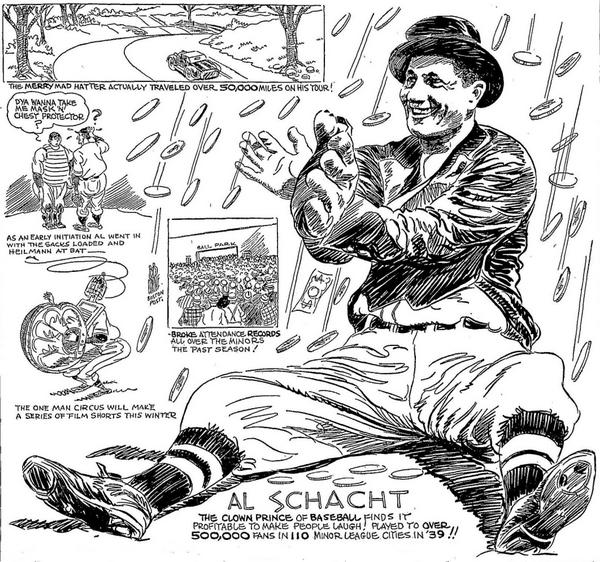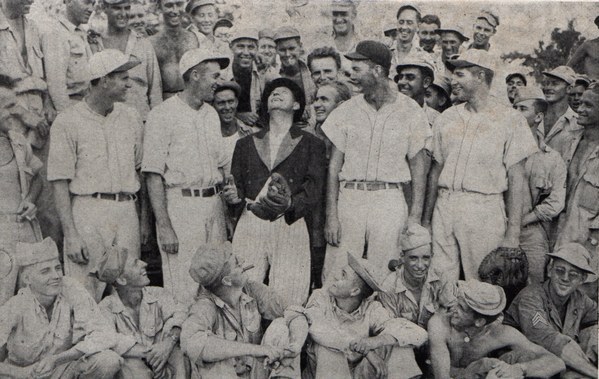

Al Schacht Entertains the Troops Overseas
by Gary Bedingfield
 Alexander
“Al” Schacht was born on November 11, 1892 in the Bronx, New York.
The Clown Prince of Baseball, as he would become known, was a
self-confessed baseball addict who had pitched for the Washington
Senators between 1919 and 1921. A sore arm ended his playing days
but he turned to
coaching and also developed a comedy routine that
consisted of comic acts, jokes and player impersonations. During
rain delays he was famous for plopping down in a mud puddle with two
bats, and rowing as if he was in a boat. He was also known for
staging mock boxing and tennis matches on the field.
Alexander
“Al” Schacht was born on November 11, 1892 in the Bronx, New York.
The Clown Prince of Baseball, as he would become known, was a
self-confessed baseball addict who had pitched for the Washington
Senators between 1919 and 1921. A sore arm ended his playing days
but he turned to
coaching and also developed a comedy routine that
consisted of comic acts, jokes and player impersonations. During
rain delays he was famous for plopping down in a mud puddle with two
bats, and rowing as if he was in a boat. He was also known for
staging mock boxing and tennis matches on the field.
“It was not until the summer of 1942,” Schacht wrote in GI Had Fun, his autobiographical account of his wartime tours, “some six months after Pearl Harbor, that World War II first affected me personally.
“A lot of us knew there was a war going on but we weren’t taking it any too seriously. The general feeling was that this was a ball game between the major leagues and a Class D outfit, and that as soon as our side got warmed up, we’d take care of Japan in a couple of months.”
In the middle of Schacht’s clowning tour in 1943, he was asked to visit Portsmouth Naval Hospital to entertain the sick and wounded. This proved to be the inspiration to go overseas and entertain the troops away from home.
On July 28,1943 he left LaGuardia Airport on board a clipper bound for Port Lyautey in Morocco, North Africa. Schacht traveled light. All he took with him was a Yankees’ uniform, top hat, frock coat, oversized ball glove, regular glove and his spiked shoes.

Port Lyautey is 60 miles from Casablanca and served as an anti-submarine base, with PBYs flying against German U-Boats. Schacht staged his first overseas performance at the port, an impromptu show at a ball game where he performed his “nearsighted pitcher” routine.
Schacht then headed by Jeep to Casablanca for his first official show at the 69th Station Hospital with wounded men from the battles in North Africa and Sicily. “I’m here to entertain you fellows,” he told the crowd, “and I’ll do the best I can. After all, I won the First World War and I know how you fellows feel. When I was drafted in 1918, our side was losing. When they gave me my discharge, our side had won. That proves I had something to do with it.” The crowd laughed and one soldiers yelled out, “What did you do in the last war, Al?” Schacht replied, “I was a secret weapon. They hid me in a hospital at Fort Slocum. I won the Battle of Influenza.”
Schacht went on to do a show at a ball game in the afternoon, and did an evening show for Navy men. He then headed for Oran in Algeria, where the first person he met was Zeke Bonura. “When the runs, hits and errors of this war are totaled up,” wrote Schacht, “and they look around for unsung heroes of the ball game, I’m sure they’ll pin a medal on the broad chest of Zeke Bonura. What he has done for the morale of the American soldier can never be fully revealed except by the GI himself.”

Schacht staged shows at camps and hospitals throughout the area before moving on to Algiers which was home to Allied Headquarters and an embarkation point for troops who would be heading to Sicily. Again, Schacht staged a number of official and impromptu shows and even gave a performance on the cruiser USS Savannah.
Tunis, the capital city of Tunisia, was Schacht’s next stop and he toured here with a band, before departing for the island of Sicily where he put on performances in Catania and Messina.
Schacht then returned to Tunisia and staged a show at a baseball game in Bizerte between the 61st and 26th Station Hospitals. He also spent a lot of time at the 81st General Hospital entertaining the wounded. Schacht performed before a crowd of 20,000 at a baseball game in Bona and put on his last official show at a hospital in Constantine, Tunisia, before heading back to Port Lyautey for the journey home to the United States.
Schacht returned home on September 27, 1943 and was soon involved in Bond rallies, shows at Army camps, appearances for the USO and Red Cross and visits to hospitals.
On September 3, 1944, almost a year after returning from North Africa, Al Schacht left the United States for another tour. This time he was headed for New Guinea in the Pacific. His first show was held for 500 GIs at Natzab, before moving on to Oro Bay where he put on performances for the 363rd, 362nd and 139th Station Hospitals. Schacht entertained servicemen at ball games staged by the 38th Infantry Division, 1st Training Center, 278th Quartermaster Corps and 5th Replacement Depot, where he met up with major leaguer Morrie Arnovich.
“I awarded the nose championship to Morrie Arnovich,” Schacht wrote. “I got him up on the stage with me, dramatically measured his nose with my fingers, and then measured mine, and gave him the title. It takes quite a nose to beat me.”
Schacht also put on a show at a football game in Oro Bay, it was the first game of American football ever staged on New Guinea.
Schacht’s next port of call was Finschhaven at the northeast tip of New Guinea. “Finschhaven is the only place in the world where you can be knee-deep in mud and still get dust in your eyes,” wrote Schacht. He covered fourteen hospitals including the 126th Station Hospital, 4th and 60th General Hospitals, and the 2nd Field Hospital. He performed for the 97th Engineers, 14th AAA, 382nd AAA, and at the first anniversary of overseas duty of the 91st Naval Construction Battalion.
Hollandia was Schacht’s next destination in New Guinea. It was here that the 24th Infantry Division were waiting to invade the Philippines. On October 1, 1944, Schacht performed at the New Guinea World Series before major league players Hugh Mulcahy, Ken Silvestri, Al Flair, Al Kozar, George Byam, Irv Dusak and Louis Rosen.

Schacht roomed with war correspondents Bill Chickering of Time and photographer Frank Prist in Hollandia. Both were killed during the invasion of the Philippines. Schacht performed for the 71st and 79th General Hospitals before moving on to the island of Biak, where he performed for the 41st Infantry Division, at a championship ball game at Bosnek Field and at an airfield at Owi.
Schacht returned to New Guinea and entertained troops at ball games, hospitals and for sailors at the docks around Milne Bay before returning home on October 26, 1944.
A year later, Schacht was again off to the Pacific. This time he went to Manila, in the Philippines where he entertained troops at camp mess halls and ball games. From Manila, he went to Japan and staged his act before a game in Osaka. In all Schacht gave more than 120 shows during the eight-week tour.
“While I was with them,” Schacht said of his overseas tours, “I had more fun than when I was home. I went over to entertain and they entertained me.”
In 1946, Schacht was given the Bill Slocum Memorial Award. The Slocum Award is presented annually by the New York Baseball Writers Association to a person judged to have a long and meritorious service to baseball. His comedic act both for baseball fans and GIs brought him a well-deserved reward.
After the war Al Schacht concentrated on his successful New York restaurant and continued to perform at ball games. He retired in 1969 and passed away on July 14, 1984, in Waterbury Connecticut. He was 92 years old.
Created June 13, 2007.
Copyright © 2013 Gary Bedingfield (Baseball in Wartime). All Rights Reserved.